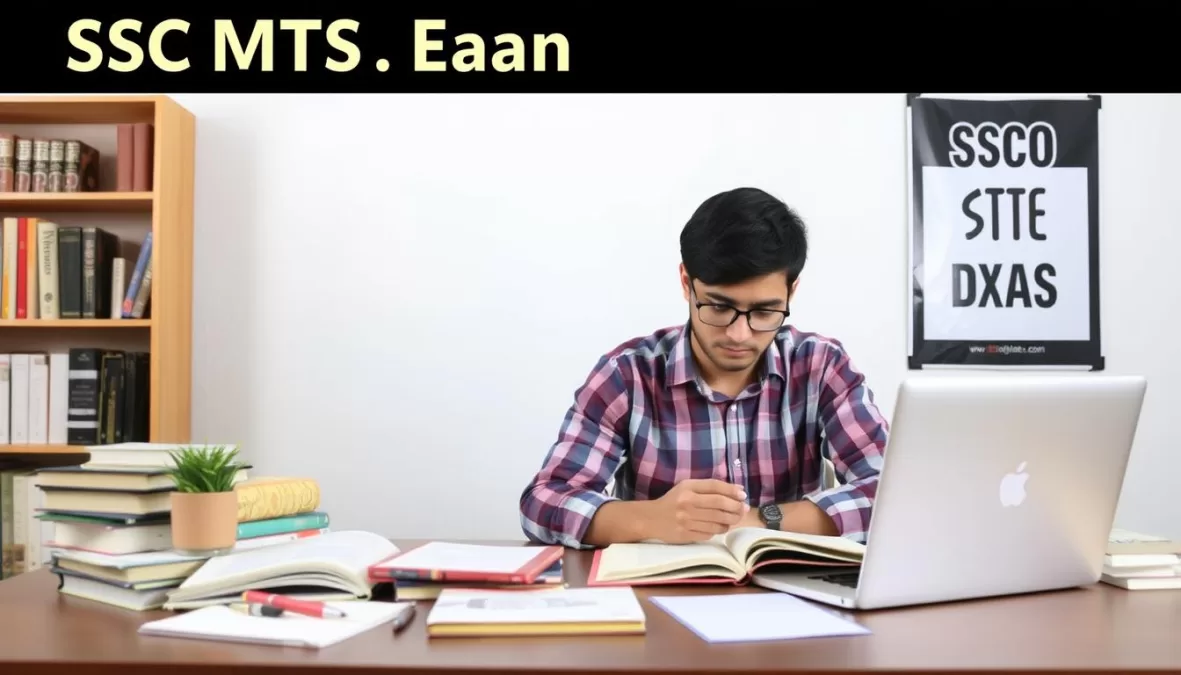Government jobs in India are highly sought after, with lakhs of people applying for these positions throughout the year. While numerous government job posts exist, varying in difficulty level, many candidates seek the easier options. Understanding which government exams are relatively easier to crack can provide a strategic advantage in career planning.
In a country where government jobs are highly coveted, identifying the most accessible exams can help candidates allocate their preparation time and resources more effectively. This comprehensive guide will explore the top government exams in India that are considered easier to crack, providing insights into eligibility criteria, exam patterns, and preparation strategies.
Key Takeaways
- Identify the most accessible government exams in India.
- Understand the eligibility criteria and exam patterns.
- Learn effective preparation strategies for these exams.
- Discover the job security and benefits associated with these government positions.
- Explore the career growth opportunities available.
- Gain insights into why these exams are considered easier compared to other competitive government examinations.
Why Government Jobs Remain Popular in India
The allure of government jobs in India remains strong, driven by factors like job security and comprehensive benefits. With around 50 government exams conducted annually, the competition is significant, yet certain exams are considered easier to clear, making government jobs accessible.
Several factors contribute to the enduring popularity of government jobs.
- Job security is a primary attraction, offering stability until retirement age.
- Comprehensive benefits, including healthcare and pension schemes, enhance financial security.
- Better work-life balance is achieved through regulated working hours and generous leave policies.
- The prestige associated with government positions is a significant motivator, especially in smaller towns and rural areas.
- Regular salary increments based on pay commission recommendations ensure periodic financial upgrades.
- The opportunity to serve the nation appeals to idealistic candidates.
- Clear career progression paths with time-bound promotions provide predictability in professional growth.
- The reservation system in government recruitment promotes social mobility.
| Criteria | Government Jobs | Private Sector Jobs |
|---|---|---|
| Job Security | High, until retirement age | Variable, often lower |
| Benefits | Comprehensive, including healthcare and pensions | Often less comprehensive, variable |
| Work-Life Balance | Generally better, with regulated hours | Can be demanding, with long hours |
| Prestige | High, particularly in rural areas | Variable, often dependent on company reputation |
| Career Progression | Clear paths with time-bound promotions | Often competitive, less predictable |
Government jobs in India offer a unique combination of security, benefits, and prestige that continues to attract a large number of aspirants. Understanding the factors that make these jobs so appealing can help candidates navigate the competitive landscape more effectively.
What Makes a Government Exam “Easy” to Crack?
Understanding what makes a government exam “easy” can significantly improve a candidate’s chances of success. While competitive exams in India are generally known for their toughness, there are a few that are relatively easier to crack.
Several factors determine the difficulty level of a government exam. These include the complexity of the syllabus, the competition ratio, and the cutoff trends from previous years. Exams with straightforward syllabi that focus on basic concepts are generally considered easier to prepare for.
- The predictability of question patterns plays a significant role in determining an exam’s difficulty level.
- Exams with fewer stages in the selection process are generally easier to clear.
- The availability of preparation resources makes certain exams more accessible.
| Factor | Impact on Difficulty Level |
|---|---|
| Syllabus Complexity | Simplifies preparation if straightforward |
| Competition Ratio | Lower ratios increase selection chances |
| Number of Stages | Fewer stages make the exam easier |
| Preparation Resources | Availability makes exams more accessible |
By understanding these factors, candidates can choose government exams that align with their interests and strengths, thereby increasing their chances of success.
SSC MTS (Multi Tasking Staff) Exam
The SSC MTS exam is one of the most accessible government exams in India, making it a popular choice among candidates.
Eligibility Criteria and Educational Requirements
To be eligible for the SSC MTS exam, a candidate must be an Indian citizen between the ages of 18 and 25 years. For the Havaldar post, the age limit is between 18 and 27 years. The educational qualification required is passing matriculation or equivalent from a recognized board.
Exam Pattern and Selection Process
The SSC MTS exam pattern consists of a Computer-Based Examination (CBE). For the Havaldar post, it includes a CBE followed by a Physical Efficiency Test (PET). The selection process is relatively straightforward, with the CBE being the primary stage.
Salary Structure and Career Growth
The pay scale for SSC MTS starts at approximately Rs. 18,000, along with certain allowances under Level 1 of the 7th Pay Commission. There are opportunities for career progression to higher grades after gaining experience.
Why It’s Considered an Easy Government Exam
The SSC MTS exam is considered easy due to its straightforward syllabus and the fundamental nature of the questions asked. The exam tests basic arithmetic, reasoning, general knowledge, and language skills.
Key advantages of the SSC MTS exam include its minimal educational requirements, a straightforward exam structure, and a relatively simple selection process.
IBPS Clerk Exam

Cracking the IBPS Clerk exam can lead to a rewarding career in public sector banks. The Institute of Banking Personnel Selection (IBPS) conducts this exam annually to recruit candidates for clerical positions in various public sector banks across India.
Eligibility and Educational Qualifications
To be eligible for the IBPS Clerk exam, candidates must be Indian citizens between 20 and 28 years of age. They should have a graduation degree in any discipline from a recognized university or an equivalent qualification. Additionally, proficiency in operating computer systems is mandatory.
Exam Structure and Selection Process
The IBPS Clerk exam is conducted in two stages: Preliminary Exam (Prelims) and Main Exam (Mains). The Prelims serve as a screening test, focusing on fundamental concepts. Candidates who clear the Prelims are then eligible to appear for the Mains, which is a more comprehensive assessment.
Salary and Benefits
Successful candidates are offered a starting salary of approximately Rs. 19,900, along with various allowances and benefits such as housing allowance, medical benefits, and pension schemes. This compensation package provides financial stability and security.
Preparation Tips for Success
To succeed in the IBPS Clerk exam, candidates should focus on sections like Reasoning Ability and Numerical Aptitude, which follow consistent question formats. Utilizing previous years’ question papers, mock tests, and specialized coaching can significantly enhance preparation.
The IBPS Clerk exam is considered relatively accessible due to its straightforward eligibility criteria and predictable exam pattern. It offers a clear pathway to a career in banking, with substantial growth opportunities.
RRB Group D Exam

The Indian Railways Recruitment Board (RRB) conducts the Group D exam annually to fill thousands of vacancies. This national-level exam is a gateway to various level 1 posts in the Indian Railways, including track maintainers, helpers, and more.
Eligibility Requirements and Age Limits
Candidates must be between 18 and 36 years old to apply for the RRB Group D exam. The educational qualification required is a 10th pass certificate along with a National Apprenticeship certificate. This minimal educational requirement makes it accessible to a wide range of candidates.
Exam Pattern and Selection Stages
The RRB Group D exam pattern consists of multiple stages: Computer-Based Test (CBT), Physical Efficiency Test (PET), document verification, and a medical test. The CBT tests basic concepts from the 10th standard curriculum, focusing on mathematics, general science, and general awareness.
Pay Scale and Allowances
Selected candidates are offered a starting salary of Rs. 18,000 plus allowances under Level 1 of the 7th Pay Commission. This provides financial stability, especially for candidates from tier 2 and tier 3 cities.
Why It’s Among the Easiest Railway Exams
The RRB Group D exam is considered one of the easier railway exams due to its straightforward exam pattern and minimal educational requirements. The selection process is relatively less competitive compared to other government exams like UPSC or SSC CGL.
The RRB Group D exam stands out for several reasons:
* Minimal educational requirement of 10th pass with a National Apprenticeship certificate.
* Wide age bracket of 18-36 years, giving opportunities to both fresh graduates and experienced individuals.
* Basic concepts from the 10th standard curriculum are tested, avoiding complex topics.
* The CBT consists of straightforward multiple-choice questions.
* The PET has reasonable standards achievable with basic fitness preparation.
* Thousands of vacancies are released annually, making the selection ratio relatively favorable.
* The starting salary is Rs. 18,000 plus allowances, providing financial stability.
* Job security and benefits associated with Indian Railways employment make this position highly desirable.
CTET (Central Teacher Eligibility Test)

The Central Teacher Eligibility Test (CTET), conducted by the Central Board of Secondary Education, is a key eligibility test for teaching positions in central government schools. It is conducted twice a year, providing candidates with multiple opportunities to clear the exam.
Eligibility Criteria for Different Papers
Candidates must meet specific eligibility criteria to appear for the CTET exam. For Paper I, candidates should have a Diploma in Elementary Education or a Bachelor’s degree in any discipline with a B.Ed. For Paper II, candidates should have a Bachelor’s degree in any discipline with a B.Ed. or a Master’s degree in the relevant subject.
Exam Structure and Marking Scheme
The CTET exam consists of two papers: Paper I for teaching classes 1 to 5 and Paper II for teaching classes 6 to 8. The exam duration is 2.5 hours, and there is no negative marking, encouraging candidates to attempt all questions.
Validity of Certification and Benefits
The CTET certificate is valid for lifetime, eliminating the need for periodic recertification. This certification is a significant advantage for candidates, as it allows them to apply for teaching positions in central government schools without worrying about the certificate’s validity period.
Strategies for First-Time Success
To succeed in the CTET exam, candidates should focus on understanding the exam pattern and syllabus. Practicing with sample papers and staying updated with the latest teaching methodologies can also enhance their chances of success.
SSC CHSL (Combined Higher Secondary Level) Exam

The Staff Selection Commission (SSC) conducts the CHSL exam annually, providing a gateway to various government posts for 12th pass candidates. This exam is considered relatively easy compared to other SSC exams, making it an attractive option for many.
Educational Qualifications and Age Requirements
To be eligible for the SSC CHSL exam, candidates must have passed their 12th Standard or equivalent examination from a recognized Board or University. The age limit is between 18 and 27 years, making it accessible to young candidates.
Three-Tier Examination Process
The SSC CHSL exam consists of a three-tier examination process. Tier I is a computer-based test focusing on basic aptitude, Tier II is a descriptive paper testing writing ability, and Tier III involves a skill test or typing test depending on the post applied for.
Pay Scale and Job Profiles
The SSC CHSL exam offers various job profiles, including Lower Division Clerk (LDC), Data Entry Operator (DEO), and Junior Secretariat Assistant (JSA). The pay scale varies by post, with LDC/JSA starting at Rs.19,900 – Rs.63,200 and DEO at Pay Level-4 (Rs.25,500 – Rs.81,100) or Level-5 (Rs.29,200 – Rs.92,300).
Preparation Resources and Success Rate
Candidates can prepare for the SSC CHSL exam by focusing on quantitative aptitude, reasoning, English language, and general awareness. The predictable pattern of questions in Tier I allows for targeted preparation. With proper preparation, the success rate for SSC CHSL is relatively higher compared to other SSC exams.
The SSC CHSL exam is an excellent opportunity for 12th pass candidates looking to secure government jobs. With its minimal application fee of Rs.100 and accessible age limit, it’s a popular choice among young aspirants.
Top 10 Easiest Government Exams to Crack in India
India offers numerous government exams that are considered easy to crack, providing ample opportunities for candidates looking to secure a stable job. These exams, while competitive, have relatively straightforward selection processes and eligibility criteria, making them accessible to a wide range of applicants.
SSC Stenographer Exam
The SSC Stenographer exam is conducted annually for candidates who have completed Class 12. It involves a two-stage selection process: a Computer-Based Test (CBT) followed by a skill test. The moderate competition level and clear eligibility criteria make it an attractive option.
RRB NTPC (Non-Technical Popular Categories) Exam
The RRB NTPC Exam offers numerous vacancies across various railway departments. With basic graduation as the qualification requirement, it attracts a large number of applicants. The exam’s structured selection process focuses on fundamental knowledge, making it relatively easier for candidates with a basic understanding of the subjects.
LIC ADO (Apprentice Development Officer) Exam
The LIC ADO Exam is an excellent entry point into the insurance sector. The selection process includes prelims, mains, and an interview. Although it involves multiple stages, the syllabus complexity is lower compared to banking exams, making it a viable option for many.
India Post GDS (Gramin Dak Sevaks) Exam
The India Post GDS Exam is unique as it doesn’t require a written examination. Candidates are selected based on their 10th class marks, making it one of the easiest government jobs to secure for those with good academic records.
State PSC Exams
State PSC Exams, particularly for non-gazetted posts, often have lower competition levels compared to UPSC exams. They offer job security and benefits within state government departments, making them an attractive option for many candidates.
Delhi Police Constable Exam
The Delhi Police Constable Exam features basic eligibility requirements, including a 12th pass qualification. The selection process involves a written test and a physical fitness test. With thousands of vacancies announced regularly, it’s a popular choice among candidates.
RPF Constable Exam
The RPF Constable Exam is conducted by the Railway Recruitment Board for security positions within the railway system. The eligibility criteria include a 10th pass qualification, and the selection process involves CBT, PET, and document verification.
Here’s a summary of these exams in a tabular format for easier comparison:
| Exam Name | Eligibility | Selection Process |
|---|---|---|
| SSC Stenographer | 12th Pass | CBT, Skill Test |
| RRB NTPC | Graduation | CBT, Other Stages |
| LIC ADO | Graduation | Prelims, Mains, Interview |
| India Post GDS | 10th Pass | Merit List |
| State PSC Exams | Varies | Varies |
| Delhi Police Constable | 12th Pass | Written Test, PET |
| RPF Constable | 10th Pass | CBT, PET, DV |
These government exams offer a range of opportunities for candidates looking to secure a job in the public sector. Understanding the eligibility criteria and selection process for each exam can help candidates make informed decisions about their career paths.
Banking Sector: Easy Entry Points
The banking sector in India is witnessing a surge in popularity among job seekers due to its promise of job security and stability. With various government exams offering entry into this sector, candidates have multiple pathways to a rewarding career.

IBPS SO (Specialist Officer) Exam
The IBPS SO Exam is a gateway to specialized roles in public sector banks, including positions like Agriculture Officer and Law Officer. This exam is considered relatively easier due to its focused syllabus and lower competition compared to general banking exams.
RBI Assistant Exam
The RBI Assistant Exam is an excellent entry point into the prestigious Reserve Bank of India. It has a moderate difficulty level and involves a structured selection process, including prelims, mains, and a language proficiency test.
NABARD Grade A Exam
The NABARD Grade A Exam offers opportunities in the agricultural banking sector, with a syllabus that includes basic banking concepts and agricultural awareness. This makes it accessible for candidates interested in rural development.
Comparison of Difficulty Levels
While all these exams offer entry points into the banking sector, their difficulty levels vary. The IBPS SO Exam and NABARD Grade A Exam are considered relatively easier due to their specialized nature and focused syllabi. In contrast, the RBI Assistant Exam has a moderate difficulty level due to its comprehensive selection process.
The banking sector’s predictability in exam patterns allows for targeted preparation, emphasizing reasoning, quantitative aptitude, English language, and banking awareness. Starting salaries range from Rs.19,900 for clerks to Rs.36,000 for specialist officers, offering excellent compensation.
How to Choose the Right Government Exam for You
Choosing the right government exam can be a daunting task, given the numerous options available. The plethora of government exams in India can be overwhelming, but understanding your strengths and weaknesses can simplify the process.
To make an informed decision, several factors need to be considered. First, it’s essential to assess your educational qualifications realistically to identify government exams you’re eligible for. Some exams require only 10th or 12th pass qualifications, while others demand specific degrees or professional certifications.
- Consider your subject strengths and weaknesses when choosing an exam. For instance, if you excel at quantitative aptitude, banking or SSC exams might be suitable.
- Evaluate your available preparation time honestly. Exams like SSC MTS or IBPS Clerk can be prepared for in 3-6 months, while others might require longer commitment.
- Research the competition level by examining the number of applicants versus vacancies for different exams.
- Consider geographical flexibility, as some exams like state PSCs restrict posting locations to specific states.
- Analyze your career aspirations beyond just securing a government job, as different exams lead to varied career trajectories.
- Evaluate the exam pattern complexity, as multi-stage selection processes require different preparation strategies.
- Consider the frequency of exam notifications, as some exams are conducted annually or bi-annually.
By carefully considering these factors, you can narrow down your options and choose a government exam that aligns with your qualifications, interests, and career goals. This strategic approach will not only simplify your preparation but also enhance your chances of success in the competitive landscape of government exams in India.
Conclusion
While many government exams in India are highly competitive, there are several that offer a relatively easier path to securing a job. The landscape of government exams in India is diverse, offering opportunities for candidates with varying educational backgrounds, skills, and career aspirations.
Exams like SSC MTS, IBPS Clerk, RRB Group D, and CTET are considered some of the easiest government exams to crack. However, it’s essential to remember that “easy” is relative, and these exams still require preparation and a strategic approach.
The key advantage of targeting these exams is the shorter preparation cycle, allowing candidates to transition into secure government jobs more quickly. For fresh graduates or those looking to switch from the private to the government sector, these exams provide excellent stepping stones.
Candidates should align their exam choice with their educational qualifications, subject strengths, available preparation time, and long-term career goals. The recruitment landscape is constantly evolving, with exam patterns, syllabus, and difficulty levels subject to change.
To succeed in government exams, candidates must stay updated through official notifications and adapt their preparation strategies accordingly. Whether you choose SSC, banking, railways, teaching, or other government sectors, consistent effort, strategic preparation, and a positive attitude remain the fundamental requirements for cracking any exam, regardless of its perceived difficulty level.
In summary, while the competition for government jobs in India can be intense, there are several exams that offer a relatively easier path to success. By understanding the syllabus, exam pattern, and selection process, candidates can increase their chances of success and secure a stable job in the government sector.




